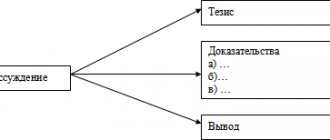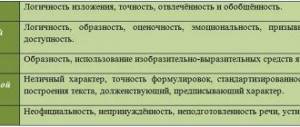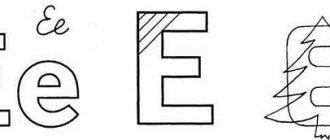Concept and grammatical meaning
Scientists have proven that the pronoun is in third place in terms of frequency of use, second only to nouns and verbs. It is included in the group of independent parts of speech. The main feature is not the exact naming of features, objects, quantities, but an indication of them.
For example: people are not called by name, but are indicated. An idea of their gender is given (he is male, she is female, it is average): She went to Katerina for a book. He stood, motionless. It rose from the bottom of the soul, an unknown feeling.
The world of pronouns is diverse in terms of vocabulary and morphological characteristics: after all, they perform the function of substitutes, replacing different parts of speech. For example: Pass me the red apple. Let’s replace the adjective “red” with the pronoun “this.” Pass me that apple. People didn't want to leave their tents. We will replace the noun “people” with the pronoun “nobody”. Nobody wanted to leave the tents. Please note: the main meaning of the message is not lost during substitutions.
Determinative questions of pronouns are borrowed from those parts of speech that they replace: So many (how many?) will not fit in a bag. It (what?) lay untouched for a very long time. Everyone (who?) wants to be successful. My (whose?) diary was left with the teacher. There (where?) there are crocodiles. Then (when?) Volodya decided to come out of hiding.
Pronouns do not have their own morphological characteristics. They “adjust” the characteristics to the replaced parts of speech.
Constant signs of pronouns
Immutable features are represented by digits by value. Each category has its own important role.
The purpose of the personal pronoun is to indicate:
- to specific persons: you go to the exhibition? You were adorable! I bought milk. We will definitely win!
- on objects, people about whom they say: She received a “d”. He got lost in the big city. It is endless. They left, but soon returned.
In sentences, the initial forms of personal pronouns change and are written with different prepositions: at, to, for, with, thanks. For example: Thanks to her, Olga got back on her feet. He had many books. They are the future.
The category of reflexive pronouns includes two pronouns:
- herself - indicates actions aimed at the person performing them: She was proud of herself. He took off all his armor;
- own - indicates the belonging of objects, things, properties to the person, animal, plant referred to in the sentence: Boris knew his character. Natasha took her backpack off her shoulders. The swallows spread their wings. The shoots unfurled their tiny leaves.
The purpose of the possessive pronoun is to show the belonging of things, qualities, objects to a certain person; the questions “Whose?”, “Which?” are asked to him: My last name is Petrov. Your document is ready. Our train leaves in an hour. Your item has arrived. His car is behind the parking lot. Her profession is doctor. They were bound by bonds of friendship.
There is a relationship between them and personal pronouns: I am mine, you are yours, you are yours.
Interrogative pronouns are necessary to formulate questions:
- about a person, an object: Who came in last? What does Maxim want to tell us?
- about the belonging, qualities, characteristics of objects: Which author wrote this book? Which item is counting? Whose hat is under the shelf?
- about the number of persons, objects: How many people will come? How many sandwiches will you order?
In sound and spelling, relative pronouns are similar to interrogative pronouns. The differences lie in syntactic function: interrogative pronouns are used as a question; The role of relative pronouns is to connect parts of complex sentences as connecting words: The guys talked about what will happen tomorrow. Vasya looked into the car that was parked at the entrance. Alina asked what color her mother liked. No one knew whose dog was barking at night. I know how much this suit costs. The jury announced who became the winner of the competition. The neighbors realized what the new owner of the house was like in character.
Interrogative and relative pronouns participate in the formation of negative pronouns. Prefixes are added to them:
- unstressed ni-: Nobody answered. Nothing surprised. People at all . Volodya is not afraid of any frost. It turned out to be no one's jacket. Anya at all that she came to her aunt. Grandpa never been so happy. anywhere . He anywhere ;
- under the stress of not-: There is no one to blame for what happened. There is nothing between friends . There is nowhere in the apartment . Masha had no time . He has no need to lie. There is nowhere the money .
The function of indefinite pronouns is to indicate unknown objects, numbers, characteristics. The basis is interrogative, relative pronouns, they are joined by:
- prefix not-: Grandmother told how a certain passer-by left a suitcase by the bench. After some time he returned. Uncle bought some oranges. Someone suggested taking part in a race. Something interesting was found at home;
- particles either, then, something, either: Someone laughed loudly under the window. something on TV . Someone's silhouettes appeared and disappeared. Someone important arrived yesterday. anything ? Some material does not suit me.
The meaning of attributive pronouns is to indicate general characteristics of persons and objects, without a specific designation: The baby himself . the entire sheet with blue watercolors. Anyone entering here must remember the rules. Each student will be given a questionnaire. My brother has a different opinion on the issue. This is the most delicious dish. No one will even look here. any clearly .
Demonstrative pronouns indicate specific objects, signs, quantities. They distinguish the object from the many proposed options: That necklace is very expensive. This comrade will get out of any situation. This move would be the right one. This much flour will be enough. Come here . Important documents are here . then . Now I'm not afraid of anything. here . from here .
The unchangeable characteristic of a personal pronoun is the category of person: 1 – I (we); 2 – you (you); 3 – he (-a, -o, -i).
What are personal pronouns?
The pronoun as an independent part of speech has several lexical and grammatical categories, among which we will indicate personal pronouns.
Let's list them:
I, you, he, she, it, we, you, they.
The very name of these words suggests that personal pronouns point to a person or thing, but do not specifically designate them. Personal pronouns answer the questions:
Who? What?
Only pronouns of this category have the morphological category of person:
Personal pronouns vary by case and number. Third person pronouns have a grammatical category of gender.
I, you, we, you
The word “I” refers to the one who is speaking or acting at the moment, but who it is, a boy, a girl, a dad, a neighbor or a coach, can only be understood in context.
I'm reading the latest newspaper.
The personal pronoun “you” indicates the person being addressed at the time of speech.
Will you go to the cinema with me?
The pronouns “I” and “you” do not have gender forms. The personal pronouns “I”, “you”, on the one hand, and “we”, “you” - on the other, do not correlate with each other in number.
“We” does not mean “a lot of me” at all, and “you” does not mean “a lot of you”. They point to the speaker or his interlocutor along with other persons.
The pronoun “you” can refer to one person or to several. It is often used as a polite way of addressing one person.
Let's compare:
You are probably our new neighbor? (You are the neighbor)
Guys, aren't you hungry? (You are the guys).
He, she, it, they
The pronouns “he”, “she”, “it”, “they” indicate a person or thing that is being spoken about, has been said before, or will be spoken about. Only these personal pronouns have a morphological category of gender.
- he is a masculine pronoun;
- she is a feminine pronoun;
- it is a neuter pronoun.
Third person pronouns change according to numbers:
he - they.
Variable characteristics
For pronouns, non-constant features are the categories of gender, number, and case. The declination of each category is different.
Personal pronouns of the 1st and 2nd persons change case forms: I (I.p.) – to me (D.p.), by me (T.p.). You (I.p.) – you (R.p.), about you (P.p.). They change by number: I (singular), we (plural).
Pronouns in the 3rd person change forms:
- cases: she (I.p.) – her (R.p.), her (D.p.);
- numbers: he (singular), they (plural);
- childbirth: she (f.b.), he (m.b.), it (wed.b.).
Most interrogative, negative, indefinite pronouns change by case like a noun:
- who (I.p.), whom (R.p.), by whom (T.p.)
- no one (I.p.), no one (R.p.), no one (T.p.)
- someone (I.p.), some (R.p.), some (T.p.)
Similar to the adjective, interrogative pronouns change: which, whose, which. For example:
- to which, whose, to whom (D.p.);
- about which, about which, about whose (P.p.).
As adjectives, the categories of possessive, attributive, and three demonstrative pronouns “such”, “that”, “this” are declined. Review the table and examples.
There are no uniform rules for pronoun declension. There are words that change in one or two categories:
- by cases: so many; yourself, no one, nothing (excluding I.p.);
- numbers and genders: such, such.
The minimum number of case forms for the pronoun “something” (I.p., V.p.).
There are no cases for pronouns:
- replacing adverbs: always, everywhere, because, here, when, etc.;
- someone, their, her, his.
Called indeclinable, they have the same form in all contexts.
Pronouns 1st, 2nd, 3rd person
Persons of pronouns in the Russian language in singular and plural are shown in the table.
| Face | Singular | Plural |
| 1 person | I | We |
| 2nd person | You | You |
| 3rd person | He She It | They |
First person personal pronouns have a distinctly personal character: “I’ll do it myself.” Widely used in oral speech. In writing, his capabilities are limited. Used mainly in fiction, reports, essays, polemics, interviews.
In the plural, it indicates the speaker’s connection with other persons: “We were very young.” Sometimes the author uses the plural to show his solidarity with the reader: “You and I understand that problems with garbage cannot be solved by promises alone.”
Sometimes “we” and “they” are used to show differences between cultures, social strata, and classes. A. Blok eloquently wrote about this: “Millions of you. We are darkness, and darkness, and darkness.” The pronoun “we” is often used as a word that unites all people in our country and in the world.
Often in colloquial speech “we” replaces “you” and “you”. To inspire confidence in the patient, the doctor often addresses him like this: “How are we feeling?”
Both in the singular and plural, second-person pronouns find themselves in dialogues. Very often, plural forms can be seen in advertising, in newspaper headlines: “A new furniture store invites you”, “You have never seen anything like this before.”
The second person is used in a general sense: “You are responsible for the fate of the country.” "You" and "you" can have different meanings depending on the circumstances. In one case, this may be a manifestation of close relationships, in another - familiarity or sarcasm.
In the third person they are widely used in fiction and journalism as a replacement for various parts of speech. Often works begin with pronouns, often used in newspaper headlines: “He became a hero,” “They fought for their homeland.” They change by gender, unlike other pronouns.
Correlation with parts of speech
In the first section, you learned that pronouns can replace other parts of speech, and the meaning of the statement will not be affected by the change. This property allowed some of them to bear two names: noun pronouns, adjective pronouns, adverb pronouns, numeral pronouns. They adopt from the replaced parts of speech:
- defining questions;
- grammatical features;
- similar parameters: indication of an object, its attribute, affiliation, quantity.
Let's look at examples.
I wish I knew who forgot to turn off the computer! In this sentence, the pronoun “who” replaces an animate noun, indicates a person, answering the question “Who?” Located in I.p. Based on the verb “forgot to turn it off,” we conclude that the pronoun m.p., singular.
Your idea is clear to me. The pronoun “your” replaces an adjective and indicates a sign. The defining question will be “Which?”, asked from the word “thought”. Declined in all categories: located in I.p., in singular, w.r.
Sasha won’t be able to carry so many books. The pronoun “so much” replaces the numeral, indicating quantity. We ask him the question “How much?” from the word “books”, by which we determine the case of the pronoun – R.p.
Then the guys made a wall newspaper. The pronoun “then” is used as an adverb, indicates the time of action, and answers the question “When?”
How to determine the person of pronouns
To determine the person of pronouns, we rely on knowledge of their case forms, which are presented in the following table.
| Singular | Plural | ||||||
| I.p. | I | You | he, it | she | We | You | They |
| R.p. | me | you | his | her | us | you | their |
| D.p. | to me | you | to him | to her | us | to you | them |
| V.p. | me | you | his | her | us | you | their |
| etc. | me (me) | by you (by you) | them | by her | us | you | them |
| P.p. | about me | about you | about him | about her | about Us | about you | about them |
Rubinchik Lyudmila Ivanovna
Function in a sentence
Considering that the pronoun replaces many parts of speech, it performs different syntactic functions.
- Pronouns of any category that answer the questions “Who?” What?" act as subjects in a sentence and can represent phrases with nouns: Nothing will disturb the calm of the dark waters. How much time is left until the premiere?
- The syntactic role of the predicate is performed by the pronoun in conjunction with the verbs “became”, “was”, with the verb connective “is” omitted: What will students become after graduating from college? These documents will be yours . He who?
- Definitions expressed by pronouns answer the questions of adjectives: “Which one?” and “Whose?” For example: anyone’s services. Whose ears are sticking out behind the bushes? His jacket was khaki.
- If there is an indirect case from the predicate to the pronoun, it serves as a complement: Do not do harm to others (to whom?), you yourself will be punished. Don't judge us (who?) strictly. With whom (who?) did Vasnetsov come to the director?
- Pronouns-adverbs, combinations of a pronoun and a noun are expressed by circumstance: We will walk outside the city all When will the children receive their gifts? They met at several seminars .
We've finished introducing pronouns. Think back to the sections of the topic. What caused the greatest difficulties? Read it again. To consolidate the topic, complete test tasks.



